Flamengo v Liverpool, 1981 Intercontinental Cup
Flamengo and Liverpool met in Tokyo in December 1981 as the champions of South America and Europe. They were competing for the Intercontinental Cup – known as the Toyota Cup after its sponsor at the time – and the title of the best club team in the world.


Liverpool, having lost their league title to Aston Villa the previous season, had won their third European Cup by beating Real Madrid in May 1981. However they struggled in the early part of 1981/82 and were 11th in the First Division at the time of the Intercontinental Cup final tie. After returning, their poor form culminated in a disastrous 3-1 defeat at home to Manchester City on Boxing Day 1981. Having refused to compete in previous editions, it was to fulfil contractual obligations that the 12-time English champions travelled to Tokyo in the midst of a difficult domestic season. After this disappointment and the Boxing Day defeat, only in 1982 did Liverpool recover their form, launching a spectacular comeback to clinch their fifth league title in seven seasons under Bob Paisley.
Flamengo had clinched the Campeonato Carioca a week before meeting Liverpool in Tokyo, beating Vasco de Gama at Rio’s Maracanã Stadium. As winners of the 1980 Campeonato Brasileiro Série A, they entered the Copa Libertadores for the first time in 1981, triumphing over Chile’s Cobreloa in November. With a squad boasting such talent as Júnior, Leandro, Nunes, Tita and Zico, several of these players had featured for Brazil against England at Wembley in May 1981. They were determined to crown one of the most successful years in the club’s history by lifting the Intercontinental Cup.
The Brazilians adapted superbly to the poor surface at the Olympic Stadium, taking a 3-0 lead to leave Liverpool out of the game by half-time. Captain Phil Thompson expressed disappointment that “we didn’t do English football justice on the day”, while Paisley complained that he’d never seen his side “so dull, so lacking in ideas and aggression.” The Liverpool manager conceded that the better team won. Man of the match Zico believed that the European champions had underestimated their opponents – the No. 10, talisman of this Flamengo team and the brilliant Brazilian side of the 1982 World Cup, ended his playing career in Japan and managed the national team between 2002 and 2006.

Flamengo win the 1981 Intercontinental Cup – Onze magazine, Issue 73, January 1982
Eduardo Monsanto, Brazilian journalist, commentator and author of 1981 – O Ano Rubro-Negro, about the club’s historic year, recalls the game: “December 13th 1981 is seen by Flamengo fans as the most important day of the club’s 126 years history. Despite not having FIFA’s seal, the Intercontinental Cup is recognized in South America as a world title. The game was on TV starting Midnight, and when the Mexican referee Mario Rubio Vázquez whistled the end of the match at 2 a.m., a huge party started in Rio de Janeiro’s streets and all around Brazil, as Flamengo has supporters based all over the country.”
“More than taking the trophy home, the way Flamengo won, crushing Liverpool with 3×0 in only 41 minutes, is revered as one of the greatest games ever played by a Brazilian team. It’s not a special game only for the supporters, but the players are also extremely proud of their achievement. They’ll meet on December 13th, 2021, to celebrate the 40 years of that outstanding performance in a dinner in Rio de Janeiro. Raul, Leandro, Marinho, Mozer and Júnior; Andrade, Adílio and Zico; Tita, Nunes and Lico. For us, ‘Rubro-Negros’ (the nickname Flamengo fans are known for), this is not a lineup. It is a prayer.”
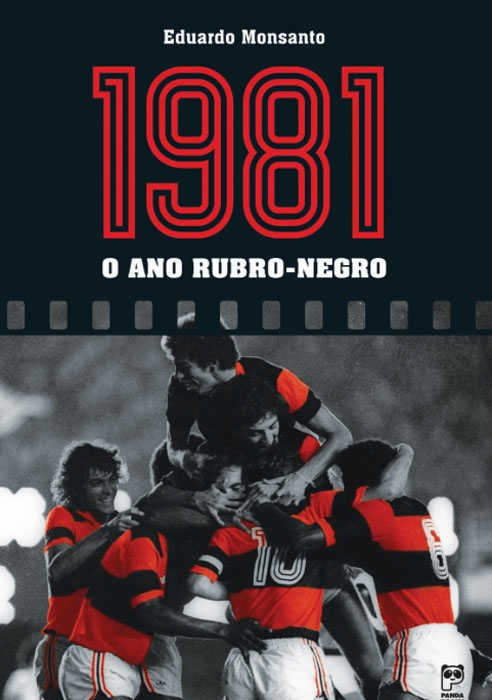

38 years later, the two clubs met in Qatar for the 2019 Club World Cup Final – the result was reversed as Liverpool overcame Flamengo 1-0, with a winning goal from Brazilian Roberto Firmino.
Match details for Flamengo – Liverpool; Olympic Stadium, Tokyo, Intercontinental Cup, Sunday 13 December 1981:
Flamengo: 1. Raul Plassman, 2. Leandro, 13. Marinho, 4. Carlos Mozer, 5. Júnior, 6. Andrade, 7. Tita, 8. Adílio, 9. Nunes, 10. Zico, 11. Lico. Manager: Paulo César Carpegiani. Scorers: Nunes (2), Adílio
Liverpool: 1. Bruce Grobbelaar, 2. Phil Neal, 3. Mark Lawrenson, 4. Phil Thompson, 5. Ray Kennedy, 6. Alan Hansen, 7. Kenny Dalglish, 14. Sammy Lee, 16. Craig Johnston, 10. Terry McDermott (sub 12. David Johnson), 11. Graeme Souness. Manager: Bob Paisley.
Attendance: 62, 000

1981 Intercontinental / World Club Cup stats (World Soccer, February 1982)
The Intercontinental Cup evolved from the impetus to create an international club competition to determine the best team in the world. With the growth of air travel between Europe and South America after the Second World War, the idea of a ‘Club World Cup’ became practical. An early attempt was the Copa Rio of 1951, an eight-club tournament which included the champions of Austria, France, Italy, Portugal, Uruguay and Yugoslavia in addition to the Rio de Janeiro and São Paulo state champions. The competition only lasted another year without FIFA approval or the participation of clubs from countries such as England or Spain.
By 1960, UEFA and CONMEBOL reached agreement to stage an Intercontinental Cup between the winners of the European Champions Cup and its South American equivalent, the Copa Libertadores, which had just begun that year. Though FIFA maintained that without any other confederations competing it was only a European-South American friendly, the Intercontinental Cup became an established competition over the following decades.

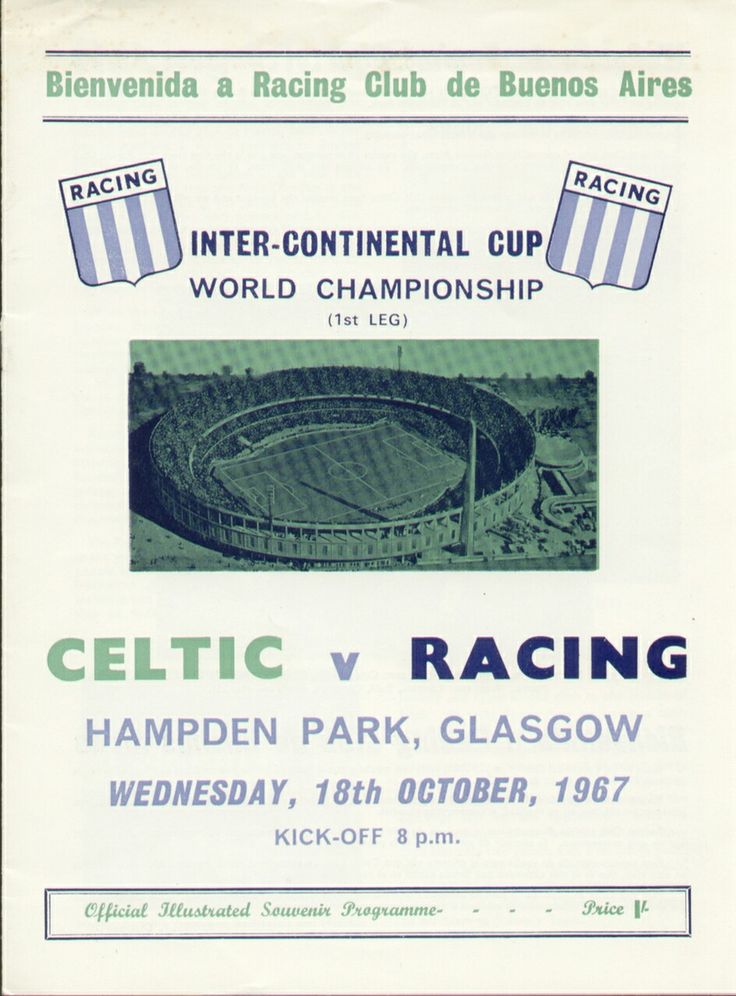
From 1960 to 1979 the cup was decided over two legs, with Real Madrid claiming the inaugural title. However, the first British European Cup winners were involved in violent encounters in South America. In 1967 Celtic met Argentinean club Racing in a tie settled by a third game dubbed ‘The Battle of Montevideo’, followed a year later by Manchester United’s ugly clash with Estudiantes. Even worse was to follow for AC Milan in 1969, with sustained aggression against the Italian side in Buenos Aires. That reputation for violence damaged the competition’s prestige, and over the next decade several European champions declined to take part (Ajax twice, Bayern Munich, Liverpool and Nottingham Forest), replaced by the beaten finalists. The fixture was cancelled altogether in 1975 and 1978, with clubs citing an increasingly crowded international football calendar.

Flamengo-Liverpool, 1981 Intercontinental Cup – Onze magazine, Issue 73, January 1982
It took the intervention of the Japanese car company, Toyota, to revive the competition from 1980. In addition to introducing a one-off fixture in Tokyo as the re-branded Toyota Cup, their sponsorship had a crucial condition attached – compulsory participation (sweetened by £75,000 for each team). 1979 European Cup winners Nottingham Forest chose not to compete in that year’s Intercontinental Cup but had no choice by 1980.
The inaugural Toyota Cup took place in February 1981, with Forest travelling somewhat reluctantly at a critical point in the Football League season. Brian Clough described his side’s participation as a ‘gamble’ and his misgivings were shared by other First Division managers, notably Bob Paisley, whose team were to follow later that year. While Clough’s team became the first British club side to wear names on the back of their shirts, the match set other precedents. Both managers complained about the bobbly, grassless Olympic Stadium pitch, and Forest lost 1-0 to the South American champions, Uruguay’s Nacional.


In contrast to English dominance in the European Cup, Liverpool (twice), Forest, and Aston Villa each lost in Tokyo as the competition was dominated by South American clubs in the 1980s. Successive managers complained about the disruption to their domestic campaign for a mid-season round trip to Japan, and the competition held little prestige in the UK. Not until 1999 was there finally an English winner, as Manchester United beat the Brazilian side Palmeiras (who had won the Copa Rio back in 1951). The Intercontinental Cup was abolished in 2004, and absorbed by FIFA into the present World Club Championship.
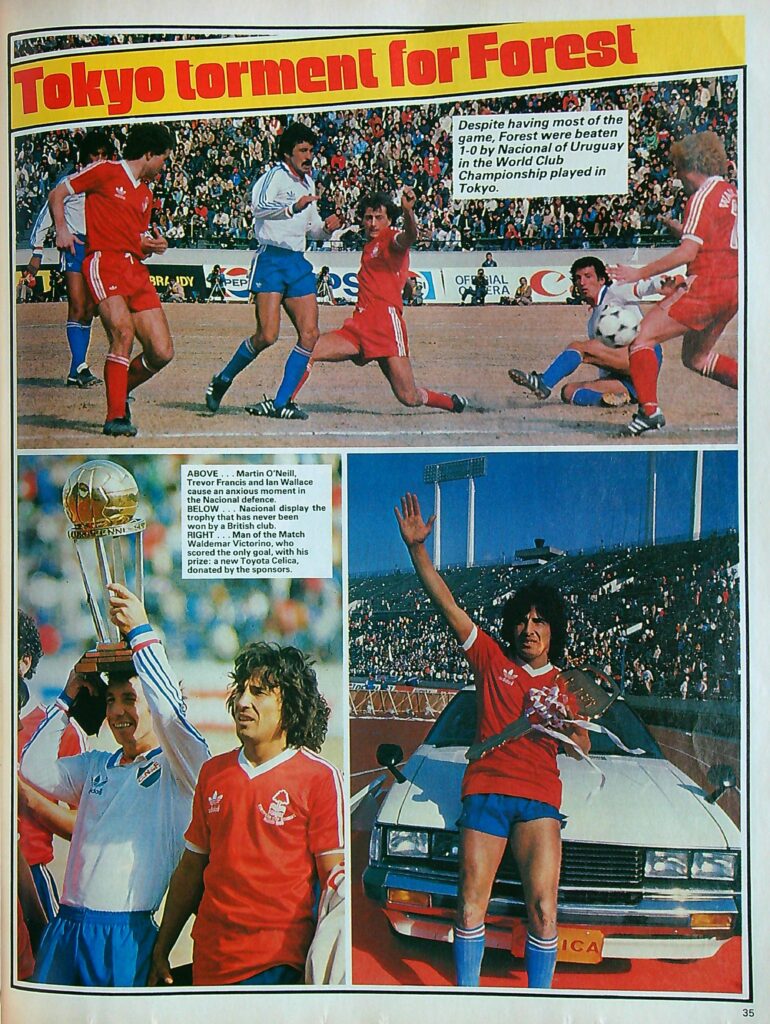
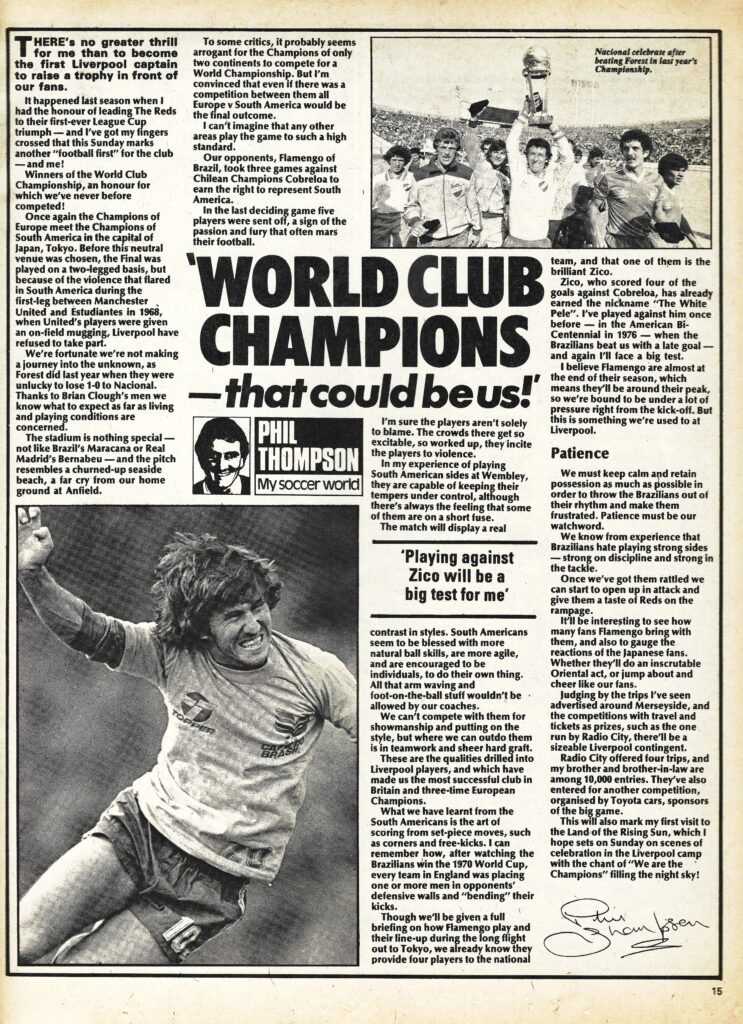
The competition is the subject of Dan Williamson’s book When Two Worlds Collide: The Intercontinental Cup Years.
With many thanks to Eduardo Monsanto for his contribution, and to Shahan Petrossian at Soccer Nostalgia for images from France Football, Onze and World Soccer.
Liverpool’s fortunes at home and abroad feature in my book Before the Premier League: A History of the Football League’s Last Decades.
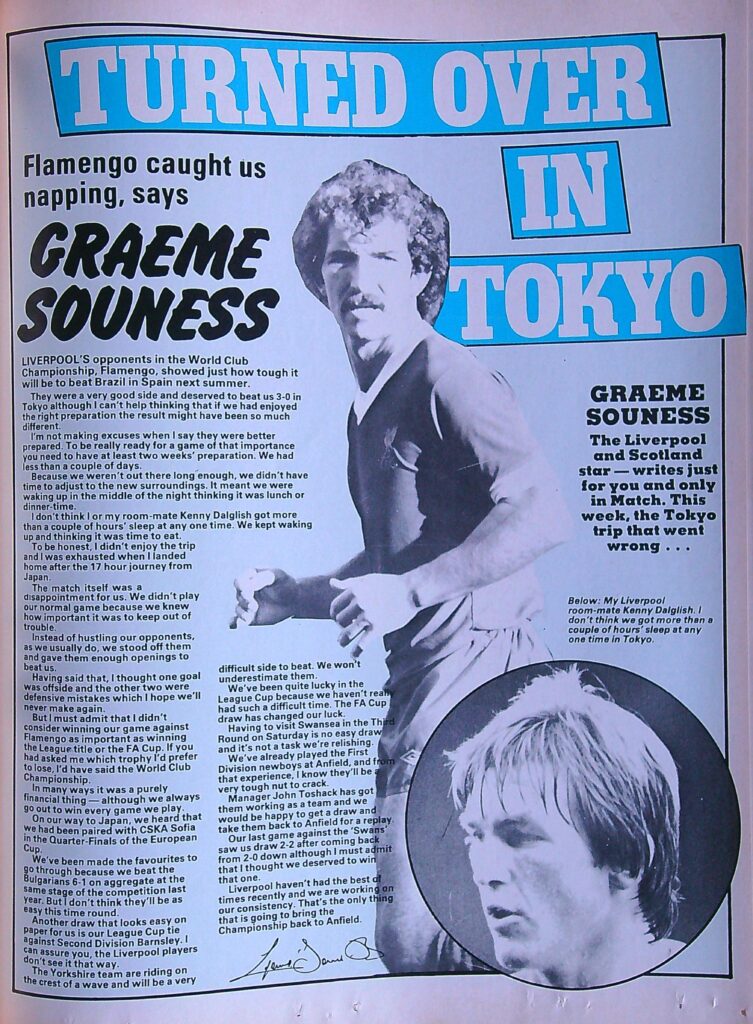
‘Turned Over in Tokyo’ (Match 1982)